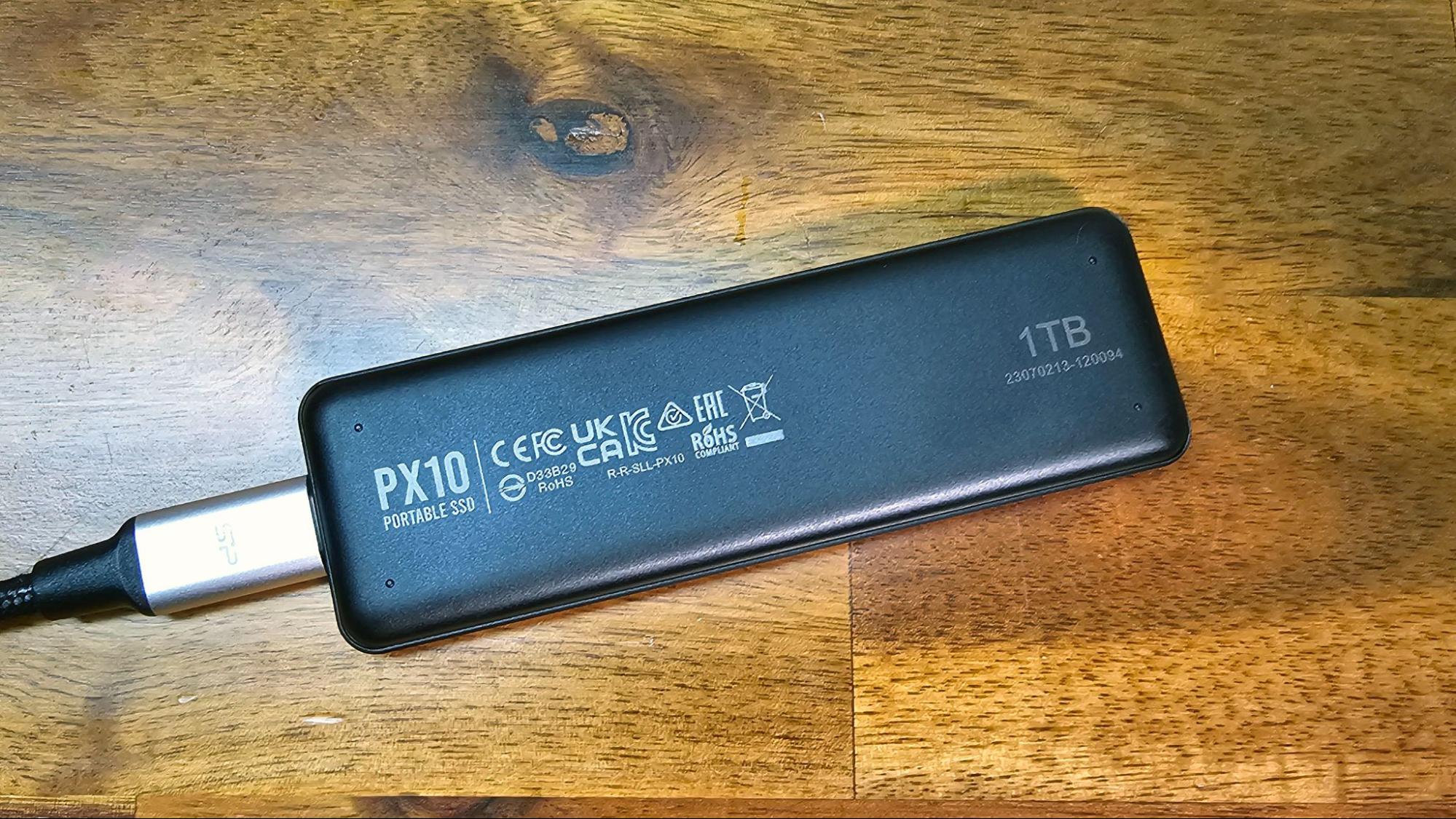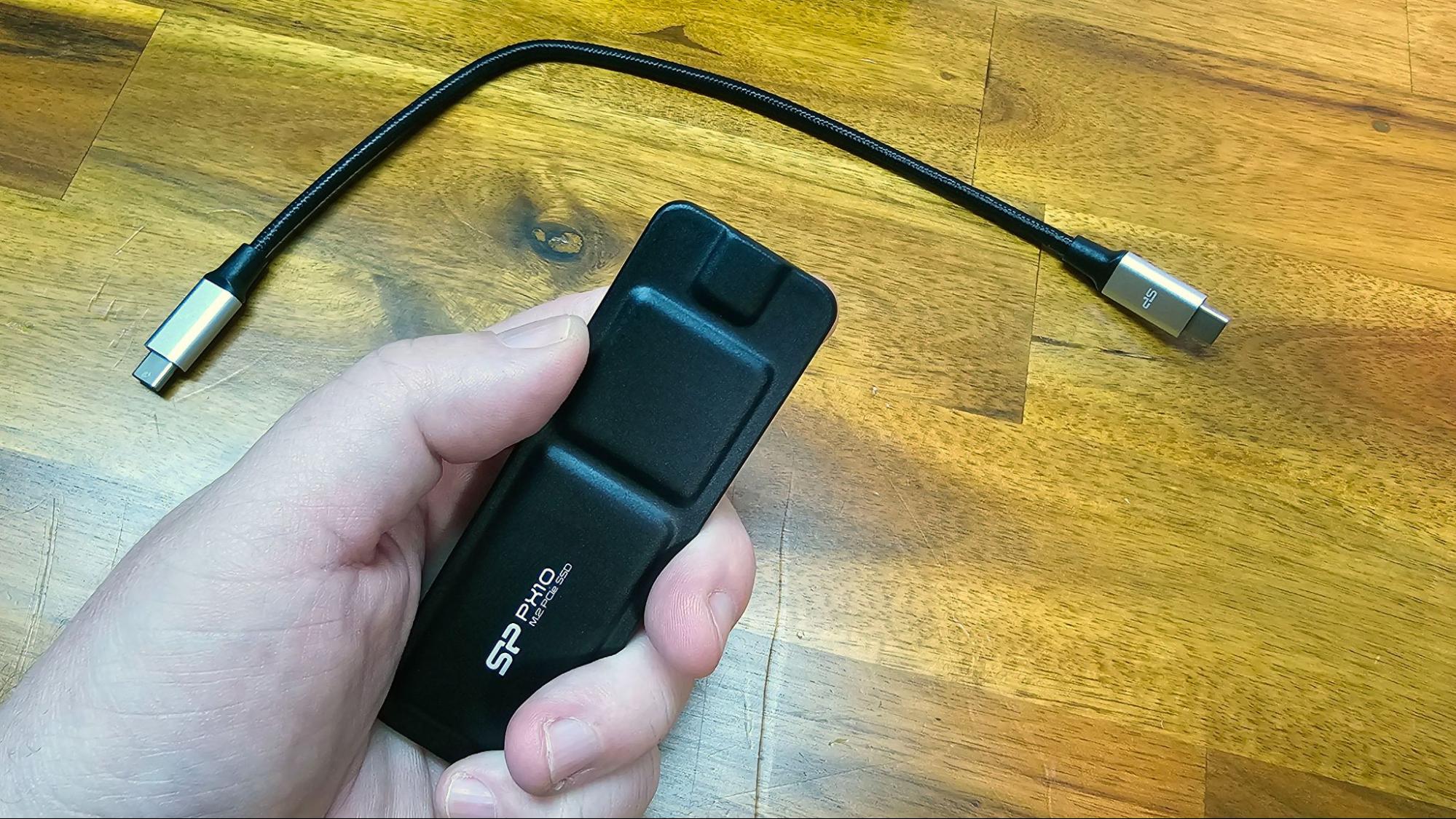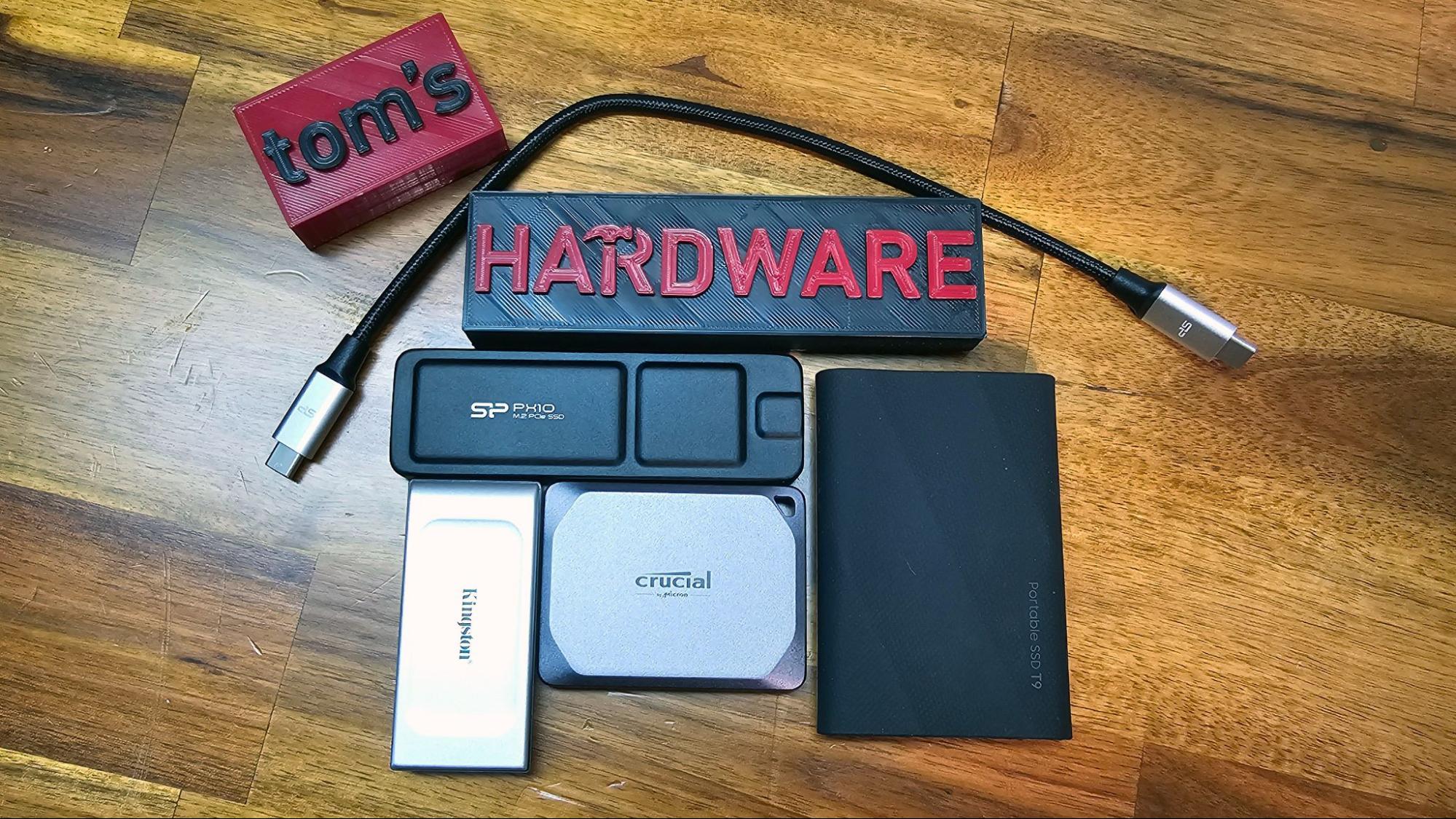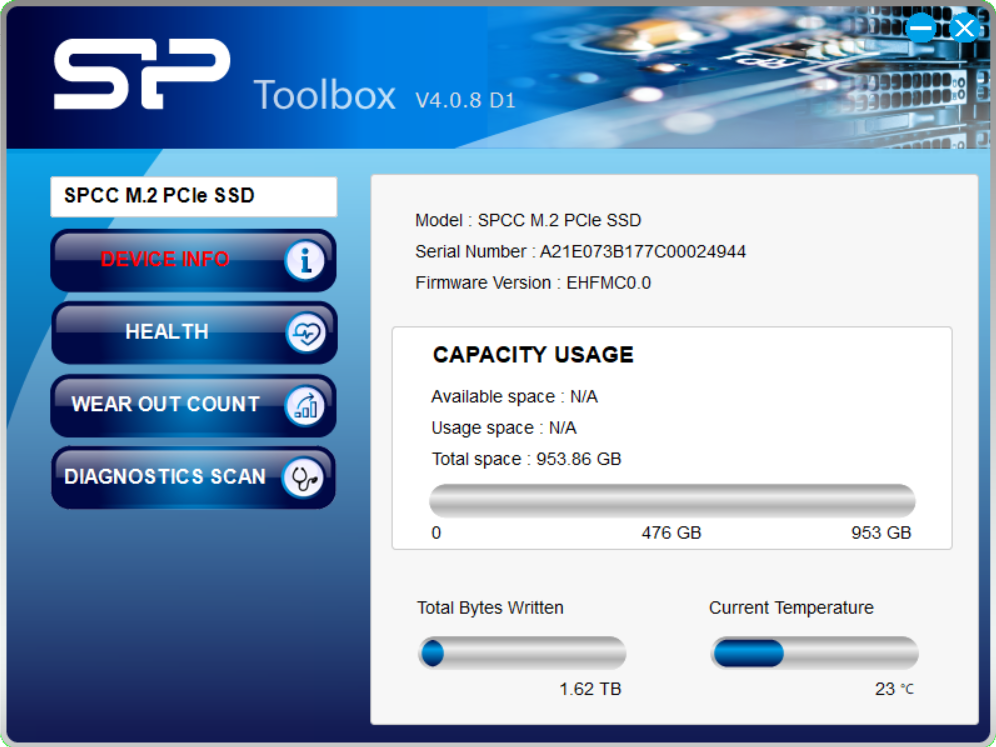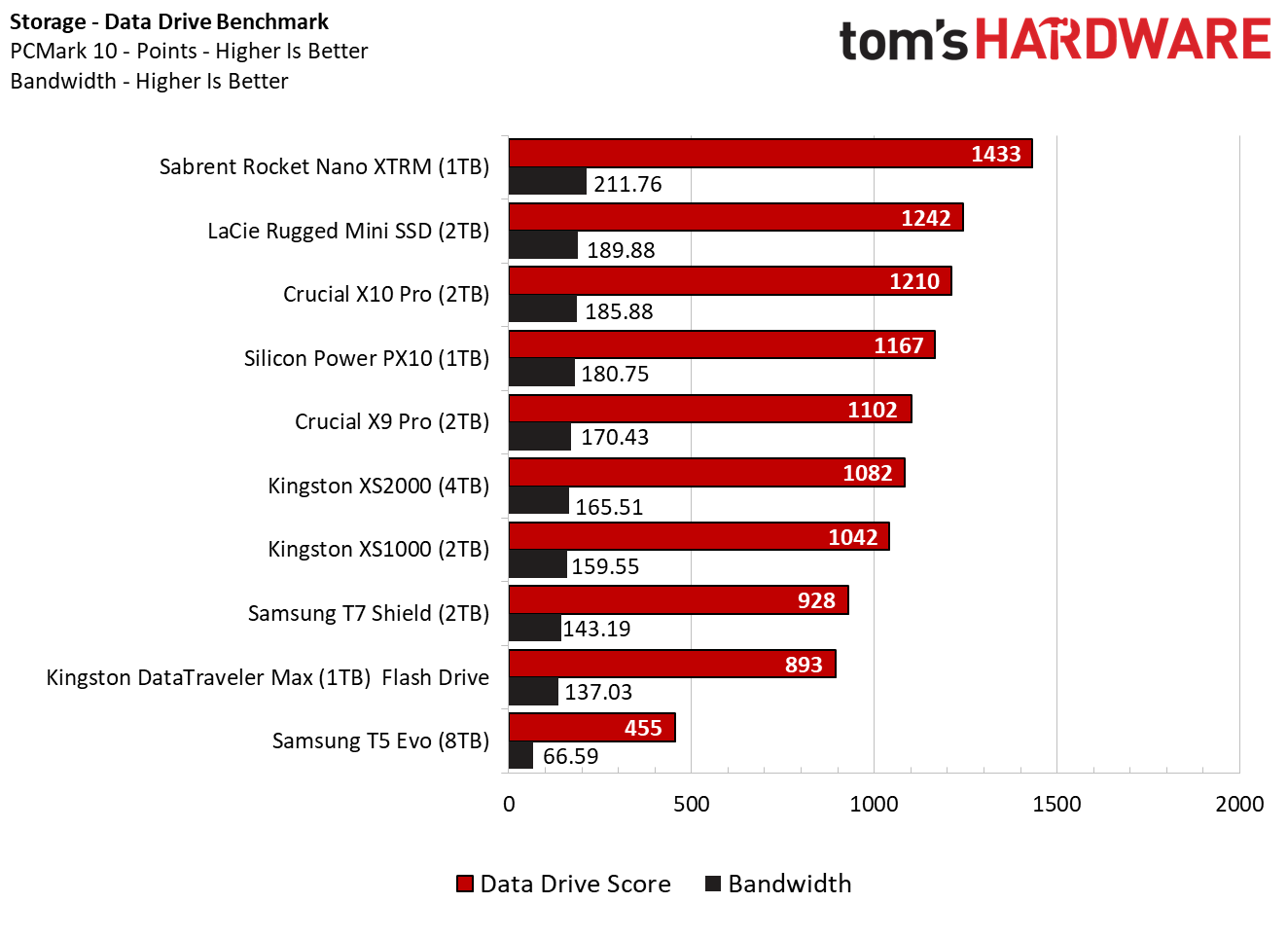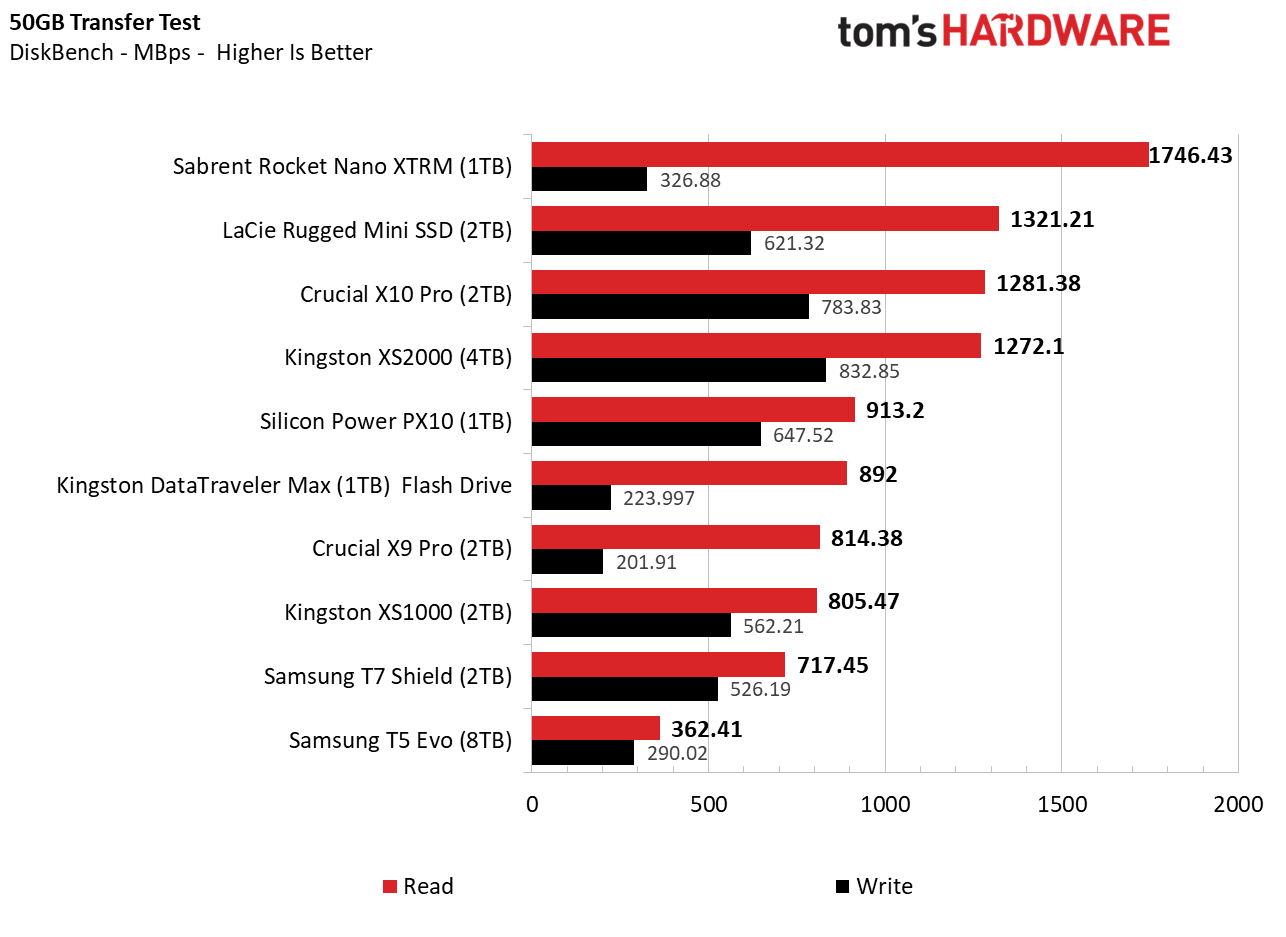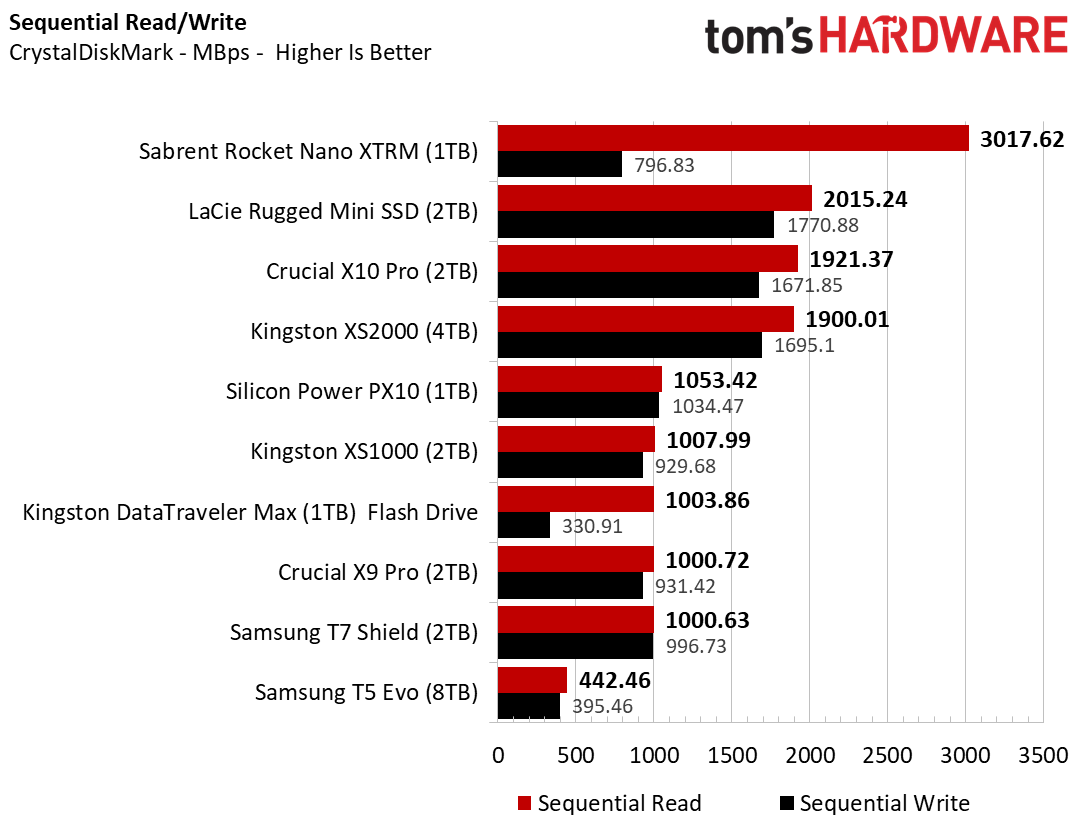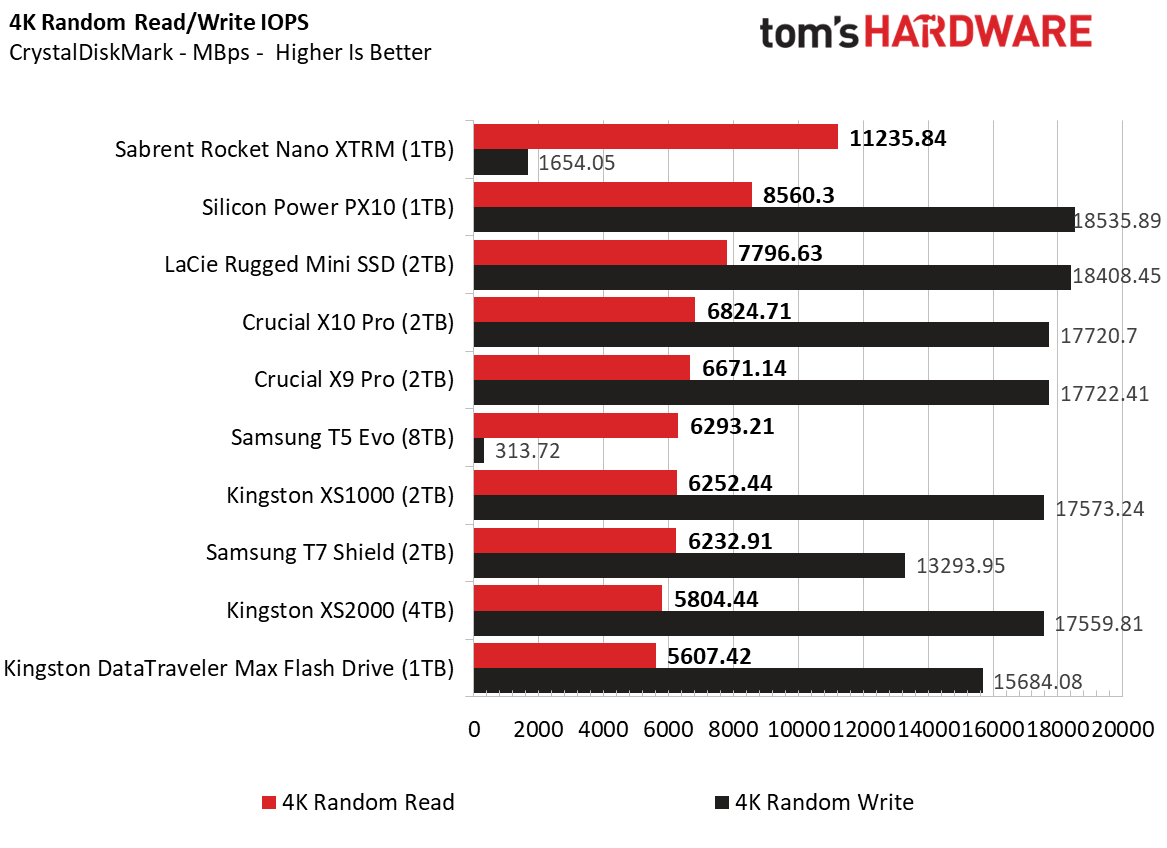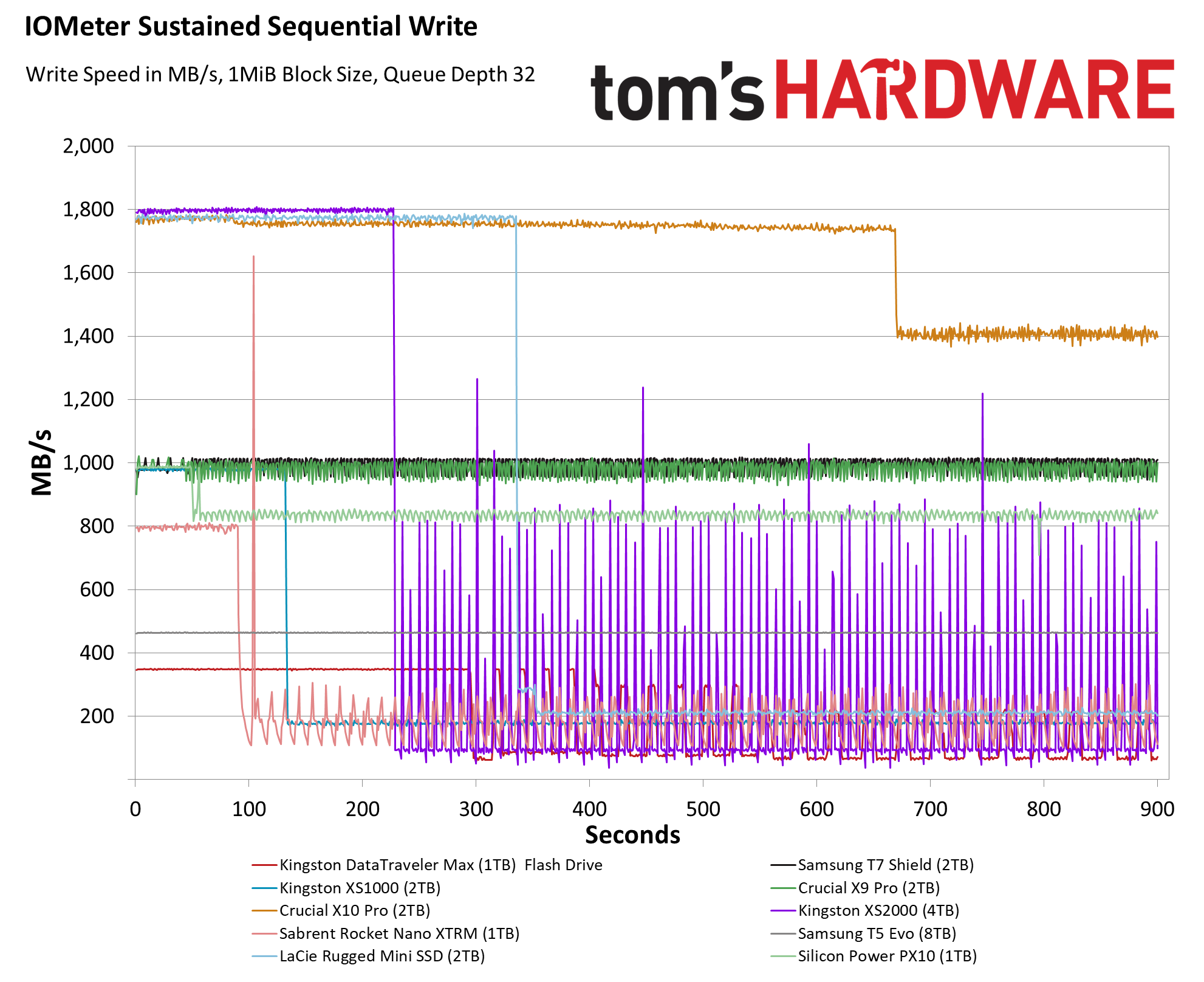Tom's Hardware Verdict
Silicon Power's PX10 portable SSD is surprisingly swift in many of our benchmark tests, especially considering it undercuts bigger names like Samsung and Crucial on price. Professional users looking for max sustained 10Gbps performance may want to spend a little more, but more general users will find this drive a speedy, pocket-friendly bargain.
Pros
- +
Excellent general performance for a 10Gbps drive
- +
Undercuts bigger brands on price
- +
Nice braided USB-C cable
- +
Available in capacities up to 4TB
Cons
- -
Lacks hardware-based encryption
- -
Aluminum shell gets quite warm during sustained writes
- -
Sustained performance lags a bit behind the competition
Why you can trust Tom's Hardware
Silicon Power might not be the biggest name in storage, but the Taiwanese company regularly churns out impressive products, particularly at the value end of the spectrum. And its latest external SSD, the PX10, looks to continue that legacy. The aluminum-wrapped USB 3.2 Gen2 (10Gbps) drive is available in 1TB (the model we tested), 2TB, and 4TB capacities and starts at just $79.99 – that's $15-20 cheaper than Crucial's 1TB X9 Pro or Samsung's T7 Shield, and in many of our tests (pretty much all of them, save for the heavy hitting 15-minute Iometer test) it's faster than those drives.
It's also very thin and narrow, doing little to hide the M.2 SSD that's obviously hiding under its shell. But that also makes it easy to slide into your pocket. It also ships with a premium foot-long braided USB-C cable that the company also rates to 60W of charging – should you want to use it for things other than plugging in your external storage.
The Silicon Power PX10 isn't ground-breaking in any particular way. But its performance is surprisingly swift for 10Gbps-class drives, and its price is appealing. About the only obvious absence here is that Silicon Power makes no mention of AES encryption. Also, while the PX10's sustained performance was very good in our tests, hovering mostly around 850MB/s, the above-mentioned Samsung and Crucial drives stick closer to 1,000MBps. This, plus the brand cachet of those more well-known companies, will be worth spending a little extra for. But for general consumers looking for a budget-priced drive with few sacrifices, Silicon Power's PX10 is an enticing option.
Specifications
| Product | 1TB | 2TB | 4TB |
|---|---|---|---|
| Pricing | $79.99 | $127.99 | $212.99 |
| Interface / Protocol | USB 3.2 Gen2 (10Gbps) | USB 3.2 Gen2 (10Gbps) | USB 3.2 Gen2 (10Gbps) |
| Included | USB Type-C to Type-C cable | USB Type-C to Type-C cable | USB Type-C to Type-C cable |
| Sequential Read | 1050MB/s | 1050MB/s | 1050B/s |
| Sequential Write | 1050MB/s | 1050MB/s | 1050B/s |
| Endurance (TBW) | Unspecified | Unspecified | Unspecified |
| Dimensions | 4.07 x 1.3 x 0.41 inches | 4.07 x 1.3 x 0.41 inches | 4.07 x 1.3 x 0.41 inches |
| Weight | 32.89 grams | 32.89 grams | 32.89 grams |
| Warranty | 3 years | 3 years | 3 years |
Design and Accessories for the Silicon Power PX10
Silicon Power's PX10 looks like an M.2 SSD housed in a slim aluminum enclosure – and that's almost certainly what it is. The drive is quite thin, with bulges around the controller and NAND package areas that take the drive up to 0.41 inches thick. Its 4.07-inch length and 1.3-inch width also mimic the dimensions of an internal M.2 SSD, albeit with some added space for USB circuitry and the enclosure itself.
All that said, the drive is extremely pocketable, just slightly thicker than Crucial's X10 Pro (0.39 inches), as well as being much narrower but about 1.5 inches longer. It also feels solid and premium thanks to its metal shell. This means it also gets quite warm to the touch under heavy loads. But in our experience, even when running our 15-minute-plus Iometer test, it didn't get too hot to hold.
There's little in the way of included accessories: You just get a single included USB-C-to-USB-C cable, which is 12 inches long and nicely braided. While it, like the drive, is only rated to USB 3.2 Gen 2 (10Gbps) speed, the company says the cable can handle up to 60W of power delivery. This is a nice bonus because the cable is premium enough that you may want to use it for purposes other than this drive.
Software of the Silicon Power PX10
Silicon Power doesn't ship the drive with any local software, but instead hosts links to drive registration, a satisfaction survey, and a link to the company's downloads page, where you can pick up the SP Toolbox.
Its design is decidedly dated, but it covers some basics, like checking drive health, temperature, and bytes written. I often don't install this kind of software unless or until something seems wrong, so I don't have a problem with what Silicon Power provides here. But there's no doubt that the drive software offerings from companies like Samsung, Crucial, and WD are much better designed and offer more features.
Comparison Products
We've recently set up a new storage testbed, built around an MSI Z90 MEG ACE motherboard and a Core i5-12600K CPU. This system gives us native Thunderbolt 4 ports and a USB 3.2 Gen 2 2x2 port via the front header (connected through Corsair's 5000D Airflow case).
As our test rig is still fairly new, we have limited comparisons that will quickly grow as we test and review more drives. In the charts below, we've included a Sabrent Rocket Nano XTRM Thunderbolt 3 drive ($170 for our 1TB), which has more bandwidth (40Gb/s) at its disposal than the other drives.
Get Tom's Hardware's best news and in-depth reviews, straight to your inbox.
To see how higher-end 20Gb/s USB drives compare, we've included Kingston's XS200 ($305 for the 4TB model we tested) and Crucial's X10 Pro ($179 when we wrote this), and a trio of lower-end 10Gb/s USB drives: Samsung's T7 Shield ($159, 2TB), Kingston's SX1000 ($1068, 2TB), and Crucial's X9 Pro ($125, 2TB). Lastly, for some perspective, we've also included one of the best flash drives we've tested, Kingston's DataTraveler Max (1TB, $93).
Crucial's X9 Pro will offer up the stiffest competition to Silicon Power's PX10 drive, as it's also rated to 1050MB/s reads and writes, and sells for $95 for the 1TB model (we tested the 2TB). Silicon Power's drive is cheaper though, at just $80 for the 1TB model we tested. And as we'll soon see in our testing, the SP drive often lands ahead of the Crucial X9 Pro.
Trace Testing - PCMark 10 Storage Benchmark
PCMark 10 is a trace-based benchmark that uses a wide-ranging set of real-world traces from popular applications and everyday tasks to measure the performance of storage devices.
Among the drives we've run through our new testbed, the higher-bandwidth Sabrent, LaCie, and Crucial X10 Pro drives take the lead. But Silicon Power's PX10 lands in a respectable fourth place here, ahead of the somewhat more expensive Crucial X9 Pro.
Transfer Rates – DiskBench
We use the DiskBench storage benchmarking tool to test real-world file transfer performance with a custom 50GB dataset. We copy 4,617 files (images, videos, and software ISO files) to a folder on the test drive (write). Then, after leaving the system idle for five minutes, we run the same test in reverse, moving the test folder to a different location on our PCIe 4.0 testing drive.
Once again, the Silicon Power drive lands ahead of the Crucial X9 Pro here, as well as Kingston's DataTraveler Max, on this large real-world test of reads and writes.
Synthetic Testing CrystalDiskMark
CrystalDiskMark (CDM) is a free and easy-to-run storage benchmarking tool that SSD companies commonly use to assign product performance specifications. It gives us insight into how each device handles different file sizes. We run this test at its default settings.
On this sequential test, the Silicon Power PX10 again does well, beating out all the drives with 10Gbps of bandwidth. It also beats its rated 1050 MB/s read speed slightly and gets within about 15 MB/s of that speed on writes.
When it comes to IOPS, Silicon Power's drive looks even more impressive, landing in second place in random reads and first place in writes. It doesn't quite blow away the competition, but for what amounts to a budget drive, this is a surprisingly good showing.
Sustained Write Performance
A drive's rated write specifications are only a piece of the performance picture. Most external SSDs (just like their internal counterparts) implement a write cache, or a fast area of flash, programmed to perform like faster SLC, that absorbs incoming data.
Sustained write speeds often suffer tremendously when the workload saturates the cache and slips into the "native" TLC or QLC flash. We use Iometer to hammer the SSD with sequential writes for 15 minutes to measure the size of the write cache and performance after the cache is saturated.
In this, the most grueling of our storage benchmarks, Silicon Power's slim drive was a solid performer, but not quite as impressive against its direct competition. It started out writing around the 1000MB/s mark, but dropped to the mid 800s after about exactly a minute, and stayed there throughout our 15-minute test and beyond. That's not a massive drop and the performance was very consistent.
But both the Crucial X9 Pro and Samsung's T7 Shield stuck closer to either side of the 1000MB/s line in the same test. That's not a huge difference in terms of percentages, but when writing large file libraries that take several minutes to complete, you'll definitely notice the extra sustained speed of Silicon Power's competitors.
Test Bench and Testing Notes
| CPU | Intel Core i5-12600KF |
| Motherboard | MSI Z790 MEG ACE |
| Memory | 2x16GB Corsair Dominator Platinum DDR5 6400 CL38 |
| Graphics | Gigabyte GTX 1080 TI |
| CPU Cooling | Corsair H150i RGB (360mm) |
| Case | Corsair 5000D Airflow |
| Power Supply | Corsair RM850x Shift |
| Storage | Samsung 980 Pro 1TB |
| Operating System | Windows 11 Pro |
We use an Intel Alder Lake platform, with most background applications such as indexing, windows updates, and anti-virus disabled in the OS to reduce run-to-run variability.
Conclusion
Silicon Power's PX10 external SSD isn't the fastest drive in every metric, even among its 10 Gbps rivals. But it does land at or near the top on many of our benchmark tests, which is a pleasing surprise given the drive's low asking price, starting at $79 for the 1TB model and just $213 for the 4TB option. Professional users who want the maximum sustained write speeds for dumping and moving massive file libraries should probably pay the $15-$30 extra for Crucial's X9 Pro, which was about 150MB/s faster in our Iometer testing.
But for those looking for a fast, slim drive at a nice price, Silicon Power's PX10 is well worth considering. Just remember that its slim aluminum frame means that it can get quite warm during prolonged use. So maybe leave it dangling from its braided cable when using it, so it can benefit from whatever airflow is available around your PC.
MORE: Best SSDs
MORE: Best External SSDs
MORE: How We Test HDDs And SSDs
After a rough start with the Mattel Aquarius as a child, Matt built his first PC in the late 1990s and ventured into mild PC modding in the early 2000s. He’s spent the last 15 years covering emerging technology for Smithsonian, Popular Science, and Consumer Reports, while testing components and PCs for Computer Shopper, PCMag and Digital Trends.
